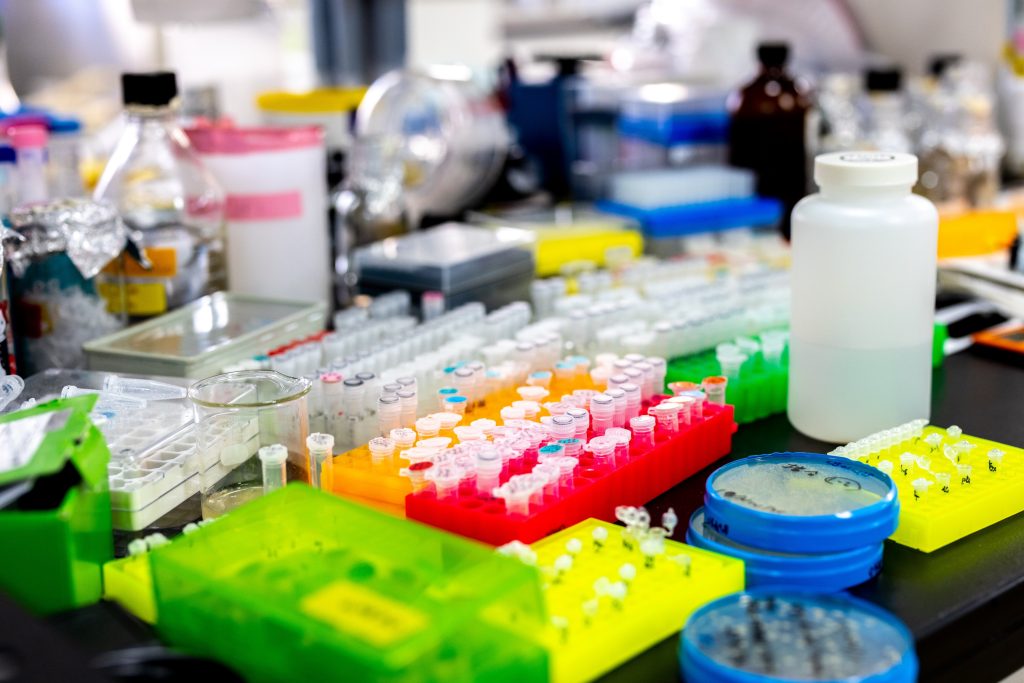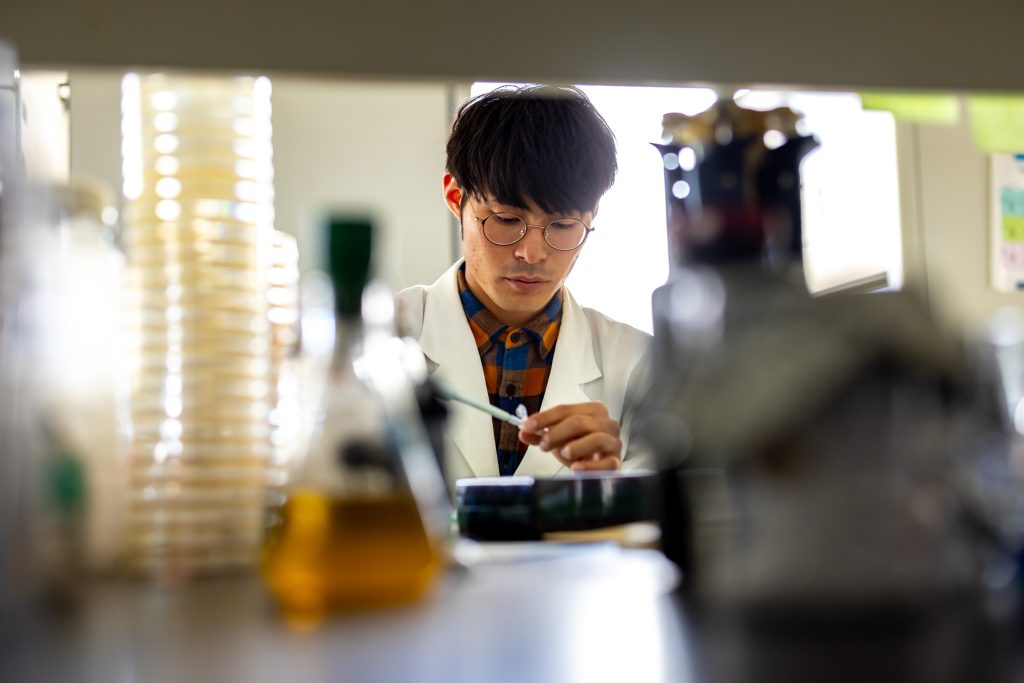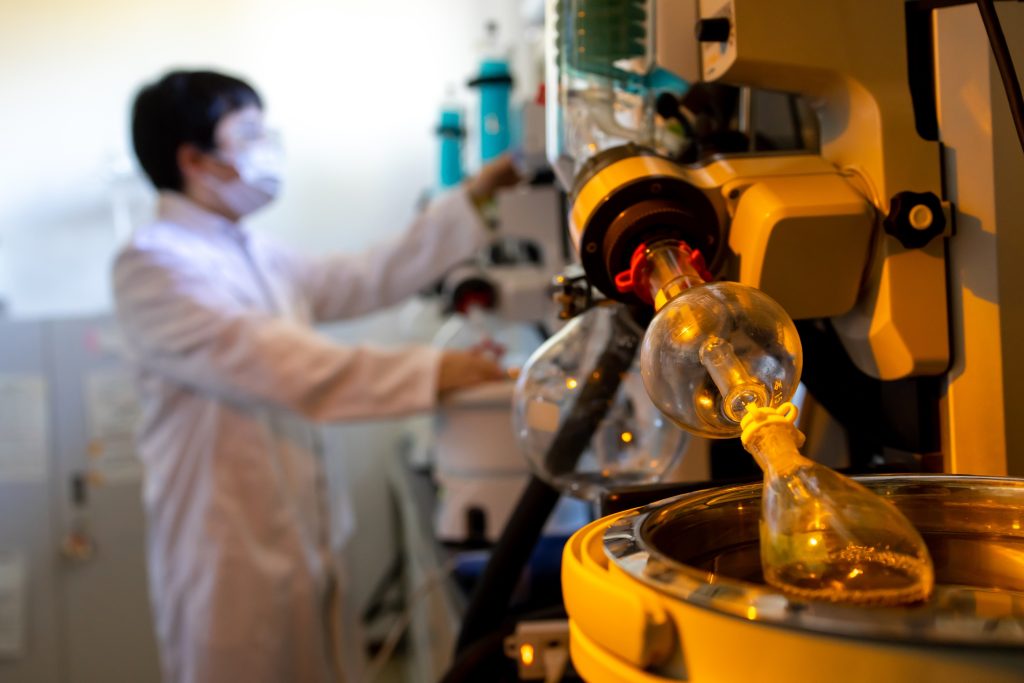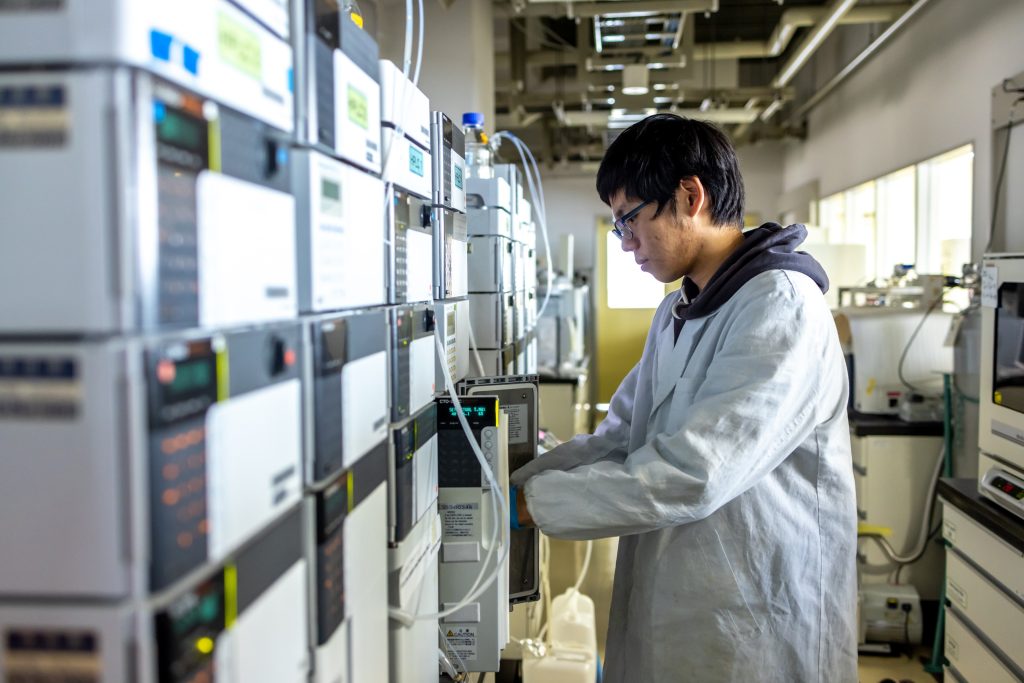RESEARCH
合成生物学に基づく創造的バイオプロダクション技術の開発/ Synthetic Biology for Novel Bioproduction Technologies
生物学は、遺伝子やタンパク質といった各種の生体分子を単離し、その構造や役割を解明することで発展を遂げてきました。一方、ヒトゲノムプロジェクトが完了した2000年代初頭ごろを境に、こうした「分解して理解する」の要素還元型の研究に加え、「つくって理解する」ボトムアップ型の研究アプローチ、いわゆる合成生物学が台頭しはじめました。合成生物学は、様々な生体分子を組み合わせ、ある特定の機能を担う生体システムを再構築することで、その働きを検証することを目的とします。また、異なる生物に由来する分子を組み合わせ、天然には存在しない生物機能を人工的に創り出し、これを産業利用しようという研究も活発化しています。私たちの研究室では、好熱菌をはじめとする極限環境微生物が示す多様でユニークな生態に着目し、これらに由来する生体分子をビルディングブロックとした人工システムをボトムアップ構築することで、環境・エネルギー・食糧といった課題の解決に貢献することを目指しています。以下に、具体的な研究テーマの例を紹介します。
Synthetic biology, a research field in which biochemically characterized biomolecules, such as genes and enzymes, are assembled to re-build particular biological systems for understanding their function, has recently emerged. Synthetic biology has also been employed to develop artificial biological systems which can be used in various industrial sectors, including chemical, food, energy, and environment. Our laboratory focuses on the diverse and unique physiology of extremophiles, such as thermophiles, and aims to develop novel industrially useful systems by combining their biomolecules with synthetic biological approaches. Some representative examples of our activities are shown below.

好熱性酵素を用いた人工代謝経路の細胞外構築/ Construction of in vitro metabolic pathways with thermophilic enzymes
微生物を利用した物質生産技術であるバイオプロセスは、持続型産業社会を構築するためのキーテクノロジーとして注目を集めています。バイオプロセスの開発では、微生物の持つ能力を最大限引き出すために、必要(不必要)な遺伝子の発現を強化(抑制)することで、その代謝経路を改変・制御する代謝工学という手法が汎用されます。しかし、生きた微生物の中には無数の遺伝子やタンパク質からなる複雑な相互ネットワークが存在するため、直接的に代謝に関わる遺伝子を制御するだけでは期待どおりの効果が得られないことも多くあります。私たちのグループでは、生物の代謝反応を担う酵素分子を取り出し、これらを細胞外で組み合わせ、代謝を模したカスケード反応を構築することで、医薬品原料や機能性食品素材などの有用物質を高収率で生産させることに取り組んでいます。この際、高温環境を好んで生育する微生物(好熱菌)が生産する耐熱性酵素を利用することで、酵素精製の簡便化とカスケード反応の安定化を実現しています。本技術は、物質生産のほか、診断や環境モニタリングに利用可能なセンサー技術としても応用可能です。
Bioproduction of useful compounds has been widely recognized as a key technology to promote the sustainability of chemical industries. Our group has developed a novel technology to engineer an artificial metabolic pathway specialized for chemical manufacturing by assembling multiple enzymes in vitro. Enzymes from thermophilic microorganisms are heterologously expressed in mesophilic hosts (e.g., Escherichia coli) and used as catalytic modules for pathway construction. This approach is, in principle, available for all thermophilic enzymes as long as they can be functionally expressed in mesophilic hosts, allowing us to design a bespoke metabolic pathway in vitro. We referred to this technology as “in vitro metabolic engineering” and construct a variety of artificial pathways for the on-demand production of useful compounds.
進化によるものづくり・いきものづくり/ Evolution-aided Biological Molecule and System Design
いかに精密かつ巧妙に機能する生体分子(あるいはこれらが組み合わさってできる生体システム)も、それらは例外なく「進化」の所産であり、何ら知的な造作物ではありません。生物が望むと望まざると身につけている「進化」という属性が、高度に洗練された生物機能を実現します。膨大な試行錯誤の産物であるため、「進化」は一見非合理的な方法であると思われがちですが、進化は成功に裏付けられた万能なものづくり技術です。人類はこれまでにも「進化」を利用してきました。動植物の品種改良・育種などがこれにあたります。我々はこの「進化によるものづくり 〜進化分子工学〜」を、酵素・タンパク質・システム・宿主機能の改変・改良に適用します。特に高次生物機能の改良に有効なリボソーム工学やゲノム編集等に関わる先端技術を独自開発しています。
Biological systems, no matter the complexity or precision, are the result of “evolution”, not “intelligent design”. The dazzling biodiversity we see on Earth is the result of sophisticated biology driven by “evolution”. The process of “evolution” is often thought of as irrational, or random, due to its trial-and-error nature. However, mankind has used “evolution” over the course of many generations to breed ancient animals, plants, and microorganisms into the modern variants present today. Now, we harness “evolution” to develop molecular technologies. This development of new technologies requires careful design of evolutionary selection parameters to optimize the evolution process. To this end, we focus on the development of two synthetic evolution methods: ribosomal engineering and genome editing technology.

好熱菌が作る生理活性物質/Bioactive compounds from thermophiles
抗生物質や抗ガン剤など、現代の医療において不可欠な生理活性物質の多くは放線菌と呼ばれる微生物群によって生産され、これまで人類の発展に大きく貢献してきました。一方、抗生物質の多用による薬剤耐性菌の出現が深刻な問題となるなど、新たな医薬品となる候補化合物の発見と開発が喫緊の課題となっています。ところが、新規有用化合物の報告例は年々減少しています。私たちは、これまで生理活性物質の探索源としてあまり研究されていなかった好熱菌に着目し、好熱菌が生産する生理活性物質の発見と応用を目指しています。またそれらが生合成される酵素反応メカニズムの解明を行い、基礎と応用の両面から研究を推進します。並行して、依然として生理活性物質の最大の探索源である放線菌も研究対象に含め、それらが生産する新規化合物の探索も進めています。
Many of the bioactive compounds, such as antibiotics and anti-cancer drugs, are produced by a group of microorganisms called actinomycetes, which have contributed greatly to human development. On the other hand, the emergence of multidrug-resistant bacteria due to the overuse of antibiotics has become a serious problem, and the discovery and development of new candidate compounds for new drugs has become an urgent issue. However, the number of reported cases of new useful compounds has been decreasing. We have focused on thermophiles, which have not been studied extensively as a source of bioactive compounds, and are aiming to discover and apply bioactive compounds produced by thermophiles. We also elucidate the enzymatic reaction mechanisms for the biosynthesis of the compounds, and promote from both the basic and applied perspectives. At the same time, we are also searching for new compounds produced by actinomycetes, which are still the largest source of bioactive compounds.





